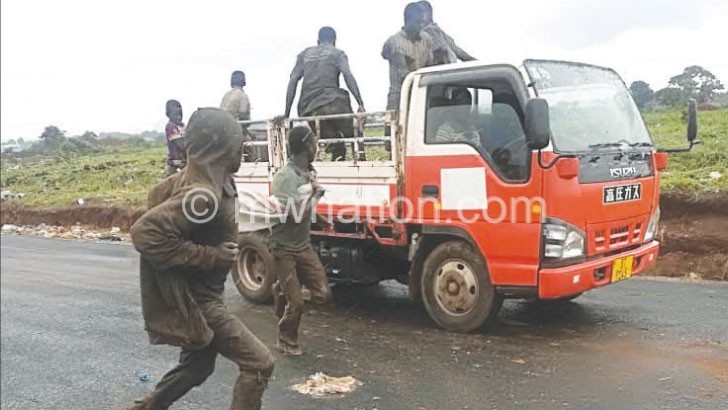Smelly side of Lilongwe
It is December 20 around 8am and many Lilongwe residents are shopping for presents for Christmas.
But Moses Bandawe, 19, and his peers are scouring leftovers and rotten goods sourced from piles of waste at Area 38 Dumpsite in Lilongwe.

For these young Malawians, it is business as usual. All day, they await trucks hauling refuse from various markets and townships in the capital city. As the refuse collection vehicles arrive at the dumpsite, the boys waiting frantically at a strategic corner jump onto the rear side in a scramble for whatever is deemed valuable to their lives.
Bandawe, who lives near the unregulated dumpsite, says his life depends on these leftovers.
“I used to go to school, but I dropped out because of financial challenges. I sell whatever I lay my hands on,” he explains.
To Bandawe, scavenging is hot business. The plastic carrier bags and bottles are bestsellers from the dumps, he says.
“On a given day, we can get items worth K1 000 to K2 000. It is not much, but it is better than stealing. At least, we can afford food and soap,” he says.
They also pick food items from the foul-smelling heaps and trucks. Some of these bites, especially meats, return to the city where they sell like hot cakes in pubs and open markets.
Amon Kananje, another scavenger, says not all the beef, chicken and eggs discarded by supermarkets, chicken farms and well-off residents are rotten.
“So, we get the meats, eggs and other food items for home use and for sale,” he says.
Although the scavengers are happy, neighbouring residents rue not only the pungent smell from the piling waste and smoky fumes from burning hospital wastes, but also flies.
“No one will get used the foul smell. The flies are multiplying. Whether you spray insecticides or apply chlorine, they do not go away,” says Brenda Malata.
She lives the distance of a football ground from the landfill opened in the early 1990s.
She narrates: “Oftentimes, we only see hospital waste being burnt. We rarely see the rotten chickens. Some people eat the rotten chickens and other meat products, risking their health.
“We are accustomed to this and we can tell if a chicken on sale is coming from the dumpsite. We never buy those. But some people buy such chicken without knowing,” says Malata.
According to Chisomo Chisinga, the chickens, beef and eggs from Area 38 Dumpsite end up in the neighbouring Chikungu slum and surrounding areas.
The locations are dominated by unskilled, low-income workers fleeing poverty from rural areas.
“We cannot move away because this is our land. We paid dearly for these plots. We try to persevere,” says Chisinga.
This gives a glimpse of how Lilongwe City, with a population of 1.3 million, is struggling to manage waste responsibly.
The World Bank estimates that an average urban resident generates 0.74 kg of waste a day.
According to Lilongwe City Council (LCC), the capital city generated about 700 tonnes of solid waste a day in 2009, but only 30 percent was being collected.
The tonnage is rising amid rapid urbanisation and population growth, worsening a global crisis at a time the world’s cities generate about 2.01 billion tonnes of solid waste, according to World Bank.
But Lilongwe has no purpose-built waste management site and equipment for dozing, compacting and covering the waste.
This means that refuse is dumped on the ground for scavengers to scramble, laments LCC chief executive officer Moza Zeleza.
“This practice leaves the disposal site as a potential public health and environmental risk. However, the council periodically hires equipment—D8 dozer, front end loaders and tippers—to clear the dumpsite to make it usable,” he states.
According Zeleza, the council plans to build a waste management plant to reduce health and environmental risks associated with the makeshift landfill.
But a civil engineer wants councils to create the room for private investors to invest in reducing, re-using and recycling waste.
Said Hastings M’bawa:“This would ensure that the collected waste is processed and recycled rather than just dumping and heaping as is the case now.
“This will create jobs for the youths and protect the environment and public health.”





